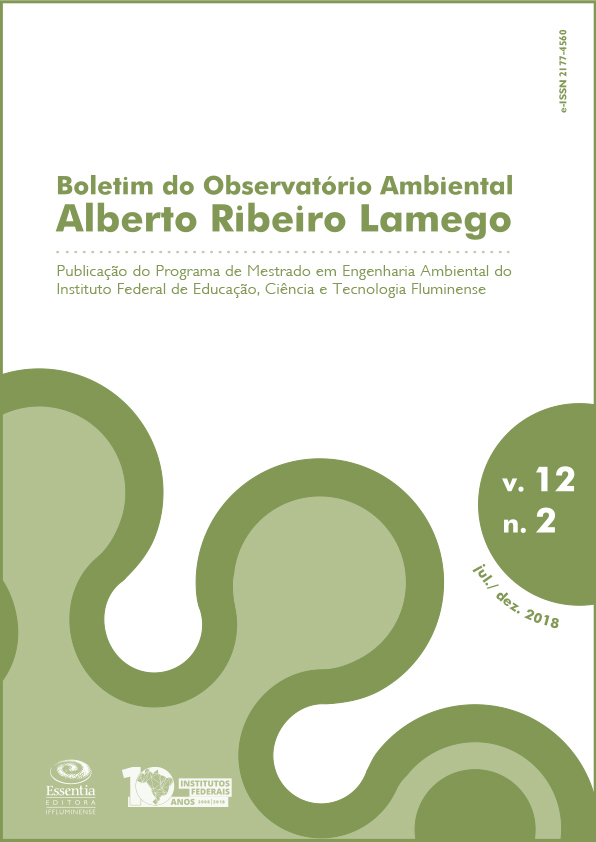A implantação do Porto do Açu: um estudo de caso sobre os conflitos ambientais do 5° Distrito de São João da Barra/RJ a partir das falas dos atingidos
DOI:
https://doi.org/10.19180/2177-4560.v12n22018p335-360Palavras-chave:
Conflitos ambientais, Complexo Logístico Industrial Portuário do Açu, História oral. São João da BarraResumo
Nas últimas décadas grandes projetos de infraestrutura foram retomados no Brasil, com o objetivo de atingir o crescimento econômico. O argumento principal para legitimar esses empreendimentos era a grande oferta de emprego e geração de renda para a população. No entanto, os empreendimentos não corresponderam à expectativa, e a realidade é uma baixa oferta de emprego, intensa degradação ambiental e acirramento de conflitos ambientais. Este trabalho analisa o Complexo Logístico, Industrial e Portuário do Açu (CLIPA), um grande projeto de desenvolvimento pensado inicialmente pelo empresário Eike Batista, localizado no município de São João da Barra, região norte do estado do Rio de Janeiro, e que foi totalmente aceito pelas instituições públicas e privadas e também pelas diferentes esferas de governo (municipal, estadual e federal). A implantação desse empreendimento gerou conflitos ambientais de diversas naturezas. Nesse sentido, esta pesquisa analisou que os conflitos ambientais surgidos a partir da implementação/atuação do CLIPA, estão relacionados a desapropriação de terras de pequenos agricultores, impedimento de pescadores artesanais em exercer sua atividade econômica em áreas próximas ao Porto do Açu e a criação de Unidades de Conservação. Este estudo também pretendeu dar visibilidade à questão ambiental e social que atinge especificamente aqueles que têm menos condições de se fazer ouvir nos espaços públicos de discussão.Downloads
Publicado
Edição
Seção
Licença
Os autores do manuscrito submetido ao Boletim do Observatório Ambiental Alberto Ribeiro Lamego, representados aqui pelo autor correspondente, concordam com os seguintes termos:
Os autores mantêm os direitos autorais e concedem sem ônus financeiro ao Boletim do Observatório Ambiental Alberto Ribeiro Lamego o direito de primeira publicação.
Simultaneamente o trabalho está licenciado sob a Licença Creative Commons Atribuição 4.0 Internacional (CC BY 4.0), que permite copiar e redistribuir os trabalhos por qualquer meio ou formato, e também para, tendo como base o seu conteúdo, reutilizar, transformar ou criar, com propósitos legais, até comerciais, desde que citada a fonte.
Os autores não receberão nenhuma retribuição material pelo manuscrito e a Essentia Editora irá disponibilizá-lo on-line no modo Open Access, mediante sistema próprio ou de outros bancos de dados.
Os autores têm autorização para assumir contratos adicionais separadamente, para distribuição não exclusiva da versão do trabalho publicada no Boletim do Observatório Ambiental Alberto Ribeiro Lamego (ex.: publicar em repositório institucional ou como capítulo de livro), com reconhecimento de autoria e publicação inicial neste periódico.
Os autores têm permissão e são estimulados a publicar e distribuir seu trabalho online (ex.: em repositórios institucionais ou na sua página pessoal) a qualquer ponto posterior à primeira publicação do artigo pelo Boletim do Observatório Ambiental Alberto Ribeiro Lamego.
A Essentia Editora poderá efetuar, nos originais, alterações de ordem normativa, ortográfica e gramatical, com o intuito de manter o padrão culto da língua, contando com a anuência final dos autores.
As opiniões emitidas no manuscrito são de exclusiva responsabilidade do(s) autor(es).









1.png)





